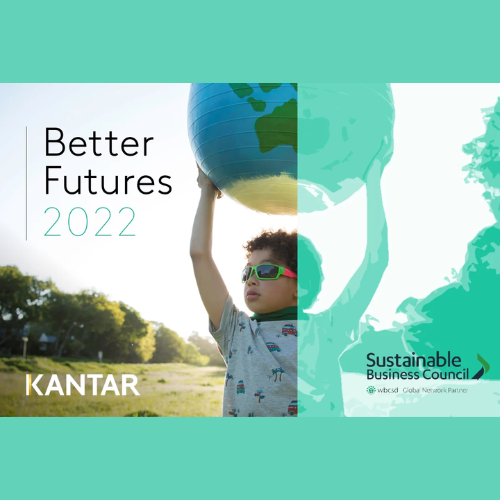Better Futures 2022
View the Better Futures 2022 Report
Economic and social wellbeing concerns intensify for Kiwis
New research reveals New Zealanders are becoming increasingly worried about their economic and social wellbeing off the back of the ongoing Covid-19 pandemic.
Kantar’s (formerly Colmar Brunton) 2022 Better Futures report, released today in conjunction with the Sustainable Business Council (SBC) surveyed 1,517 New Zealanders, finding the ongoing challenges of the pandemic continue to have a significant impact on the wellbeing of Kiwis, and the immediate issues they are facing.
Kantar’s Chief Client Officer, Sarah Bolger, says the cost of living remains the number one issue for New Zealanders, closely followed by protection of children and the availability of affordable housing.
“All of these concerns have intensified for people as they continue to grapple with the challenges of the ongoing pandemic, coupled with emerging economic challenges including rising inflationary pressures.
“For the first time we have also seen the mental wellbeing of New Zealanders enter into the top 10 concerns. Having now lived through two years of the pandemic, we are seeing the issues of social and economic wellbeing continue to compound and be at the forefront of people’s minds as they navigate their day-to-day lives,” Ms Bolger says.
Commitment to sustainable behaviours continues to grow
Despite the challenging context, New Zealander’s personal commitment to living sustainably continues to track upwards, with 43% of Kiwis committed to living a sustainable lifestyle.
“That is a 7% growth on last year, and the third year in a row we have seen an upward trend. It is also a greater percentage than we saw when Kiwi’s personal commitment levels peaked during the 2018 awakening on plastics,” says Ms Bolger.
SBC Executive Director Mike Burrell says, “It is heartening to see these results continue to track upwards, especially when New Zealanders are facing some of the most challenging times they have seen in decades.”
There also continues to be a notable uplift in reported behaviours relating to sustainable lifestyles, particularly with more and more New Zealander’s claiming to be undertaking circular shopping behaviours.
Noticeably, participants reporting to be disposing of clothing and household items through online community groups (such as Facebook and Neighbourly) rather than throwing them out saw a jump of almost 20% over the last four years.
“These are encouraging signs that some sustainable behaviours are becoming socially normative and more habitual in New Zealand, or in other words are starting to stick,” says Ms Sarah Bolger.
Concern about the impact of climate change on New Zealand has also bounced back from last year, increasing from 38% to 51%.
Waste, plastic and packaging continue to be the key environmental concerns for people.
“While climate action may still feel like it is something beyond the control of most people, waste plastic and packaging continue to be areas where people feel like they can take tangible action and feel empowered to make a difference,” says SBC’s Mike Burrell.
“With the Government due to deliver its first Emissions Reduction Plan in May, this is an opportunity for government, business, consumers and civil society to get behind a shared plan of action for New Zealand on climate change.”
Barriers to making sustainable decisions
The physical and emotional ‘effort’ required to make more sustainable decisions has for the first time emerged as a key barrier to making sustainable decisions, with 63% of participants identifying it as a factor.
Ms Bolger says, given the pressing concerns facing Kiwis, it leaves limited bandwidth to invest in sustainable decision making.
“As people continue to navigate multiple priorities, we also found thinking about the particular issue of climate change produced a range of conflicting emotions.
“When asked specifically to describe their feelings about climate change many New Zealanders reported feeling worried (44%) frustrated (36%) and helpless (24%). But they also reported feelings of hopefulness (29%) and optimism (18%) too.”
A lack of messaging clarity from businesses also continues to have a material impact on people’s inaction.
Mr Burrell says New Zealanders are seeking leadership from brands and businesses to help them navigate these barriers as well as their conflicting emotions.
“Businesses need to continue to make it easier and clearer for consumers to know how they can take action, to support them to feel empowered, rather than helpless.
“People need to feel supported to make sustainable decisions that ultimately leave them feeling energised, and businesses need to continue to play a leadership role in order to make that happen.”
The 2022 top 10 concerns for New Zealanders:
- The cost of living +3
- Protection of NZ children +4
- Availability of affordable housing +5
- Build-up of plastic in the environment +8
- Violence in society +7
- Too much waste/rubbish generated +10 (New top 10 entrant)
- Crime levels +10 (New top 10 entrant)
- Overpackaging, no-recyclable packaging and landfill +6
- Suicide rates +4
- Mental wellbeing of NZers +5 (New top 10 entrant)
Margin of error ±5% points at the 95% confidence level.
This is the 13th year Kantar (formerly Colmar-Brunton) has been monitoring the issues New Zealanders care most deeply about. Find the full 2022 Better Futures report online here.

